Adults in Turkey hold generally negative views of international powers and their respective leaders. But of the countries and organizations we asked about, Turks express the most positive attitudes toward the European Union – and a majority now support Turkey becoming an EU member, a change from 2017. As with many aspects of Turkish society, views are shaped by age, education, and opinions of Turkish President Recep Tayyip Erdoğan.
Views of the U.S., China and other world powers
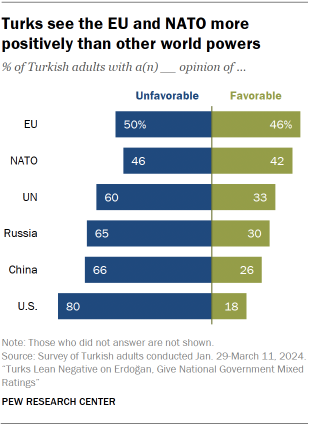
None of the six major world powers we asked about receive majority-positive ratings from the Turkish public.
The European Union (46% favorable) and NATO (42%) receive the most positive assessments. Still, more Turks have unfavorable than favorable opinions of both organizations.
Only a third of Turks have a positive view of the United Nations, and just three-in-ten see Russia favorably. Fewer still have a positive view of China (26%) and just 18% express a favorable opinion of the U.S.
Demographic differences
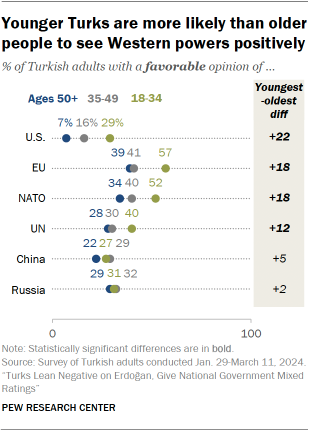
Younger Turks generally express more favorable views of several world powers than their older counterparts. For example, 29% of adults under 35 have a positive view of the U.S., compared with only 7% of those ages 50 and older.
Age differences only appear when looking at Turks’ views of the U.S., the EU, NATO and the UN. There are no significant age differences in attitudes toward China and Russia.
Similarly, Turkish adults with more education are more likely than those with less education to have a positive view of some world powers we asked about, including the U.S. and the EU.
Assessments of these powers also differ by views of Erdoğan. Turks who support the president are more likely than nonsupporters to express favorable views of Russia and China – and less likely to have favorable views of the EU, U.S. and UN.
Views over time
Since 2002, the first year Pew Research Center surveyed Turkey, there have been large changes in Turks’ attitudes toward some countries and multilateral organizations.
For example, Turks have become more positive in their views of NATO, which Turkey has been a member of since 1953. Attitudes toward NATO have especially improved since Russia’s invasion of Ukraine in 2022. Between 2011 and 2019, no more than a quarter of Turks had a favorable view of the defense alliance; today, 42% do.
Related: NATO Seen Favorably in Member States; Confidence in Zelenskyy Down in Europe, U.S.
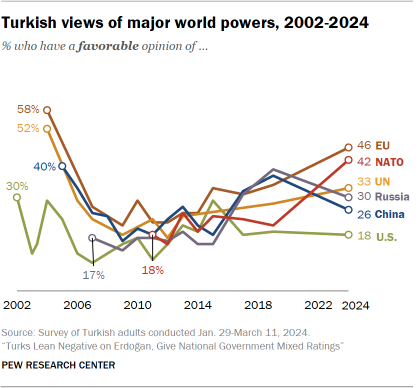
Views of Russia have also fluctuated, ranging from 15% favorable in 2015 – after Russia invaded Ukraine’s Crimean Peninsula – to 39% favorable in 2019, before the ongoing invasion of Ukraine. Currently, three-in-ten Turks have a positive view of Russia.
Attitudes toward China have also seen some ups and downs, from 40% favorable in 2005 to as low as 16% in 2009. The share is now back up to 26%.
Attitudes toward the UN are more negative today than in 2004, when more than half of Turks held favorable views of the international organization. Now, only a third do.
Turks have often given the EU the highest ratings of the world powers surveyed, but there have been significant downward and upward shifts in that sentiment. A 58% majority of Turks had a favorable view of the EU in 2004, shortly after the start of formal EU accession discussions. But attitudes had changed just a few years later and this year are about evenly split, with 46% favorable.
Views on Turkey joining the EU
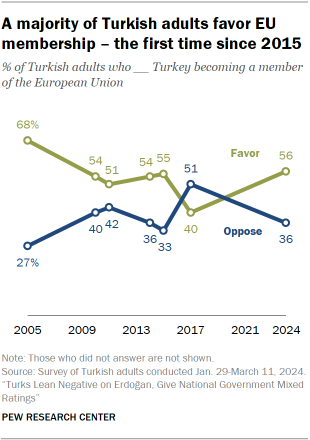
A majority of adults (56%) favor Turkey becoming a member of the EU, while 36% oppose membership.
This represents a big change from 2017, when only 40% of Turks supported joining the EU and 51% opposed. (It should be noted our 2017 survey in Turkey was conducted eight months after a failed coup attempt, which had a large influence on public opinion in the country.) Prior to 2017, half or more Turks routinely favored EU accession.
Related: How exactly do countries join the EU?
Demographic and political differences
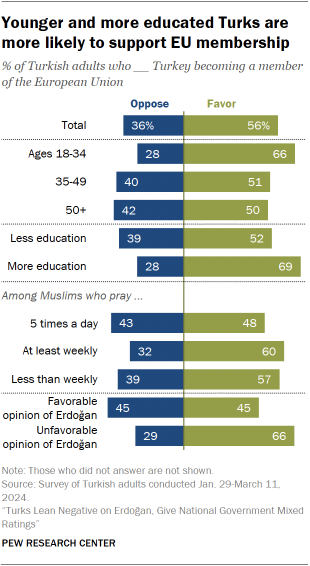
Younger Turks are especially supportive of joining the EU. Roughly two-thirds (66%) of adults under 35 support accession, while 28% oppose it. There is more tepid support for EU membership among older Turks.
Turks with a postsecondary education or more are also far more likely than those with less education to want to join the EU.
Turkish Muslims who pray less than five times per day are more likely to support EU membership compared with those who pray salah time fives daily.
Turks who support Erdoğan, meanwhile, are far less likely than other Turks to support EU accession. Among those with a favorable opinion of the Turkish leader, views evenly split between supporting EU membership and not (45% vs. 45%). Among those who have an unfavorable view of Erdoğan, 66% support joining the EU.
Views of international leaders
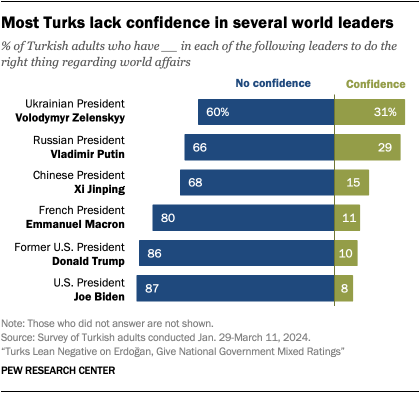
People in Turkey have little confidence in the six current and former foreign leaders we asked about in this survey. In fact, at least 60% of Turks have little or no confidence in each of these leaders.
Confidence is highest for Ukrainian President Volodymyr Zelenskyy and Russian President Vladimir Putin. Still, only about three-in ten Turks have confidence in each of these leaders.
Ratings of Chinese President Xi Jinping are even lower, with only 15% saying they have confidence in him.
Related: Do people think China’s economic influence is positive or negative?
Turks also express negative opinions of French President Emmanuel Macron. There’s been little change in Turks’ overall confidence in Macron since we first asked about him in 2019.
People in Turkey have very negative views of both the U.S. leaders included in the survey: Only around one-in-ten Turks today express confidence in President Joe Biden or former President Donald Trump.
Of the four U.S. presidents we’ve asked about in Turkey in the last 20 years, Barack Obama received the best evaluations – 45% of Turks said they had confidence in him in 2015, the last year of his presidency. George W. Bush never saw his confidence rating in Turkey rise above 8%, while Trump had similar ratings in 2017 and 2019 as he does today.




